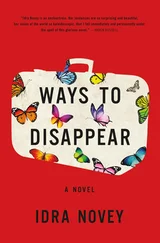“She is, right. She’s a neuropsychologist here.”
I feel like an idiot, looking at the small woman sweetly smiling up at me. How do I extricate myself?
I say, “Thank you for your help.”
“But thank you for your help.”
I’ve read about echolalia — when someone with brain damage can’t help but repeat what another person says. Perhaps she suffers from echopraxia too? A cold impulse makes me raise my right hand and wait. But she doesn’t raise hers; it’s only words that she mimics.
Behind one of the doors a toilet flushes, and a grey-haired, even more diminutive woman emerges.
“I was just standing here talking to your daughter,” I say.
Behind me I hear a voice. “Talking to your daughter.”
“Do you know whether they’ll call us, or do we go someplace first and let them know we’re here?”
I try not to listen to the daughter while the mother tells me we’ve done exactly what we should have. We just have to keep waiting. “Then a secretary will come and call you.”
“A secretary will call you.”
A few months ago, I never imagined that this secret world existed, tens of thousands of homes where there was brain damage in the family. Pigheaded people I’ve argued with in the supermarket, irrationally angry folks on the sidewalk, blockheads at public meetings — now I realize that many of them are literally sick in the head. And lots of them have friends and families who love them, and who meet up like we do in my new group.
It’s as if I’m in some film, where suddenly I can see and hear all the ghosts who walk among us. People with brain injuries have been here the whole time. I’ve met them, spoken with them, argued with them — and suspected not a thing.
• • •
By now, I’ve read lots of stories about people who have undergone neurological changes without anyone noticing. It could be due to a fall from a ladder or a bike, or to a slowly growing tumor.
We don’t normally go around diagnosing each other. Even after a thousand arguments and a divorce, it rarely occurs to a person that it might be brain damage that transformed their engaged and socially adept spouse into someone cold and stubborn. It’s only when you look back that all the pieces fall into place.
So when did what the doctors call insidious personality changes begin with Frederik?
In the case of an orbitofrontal tumor, the first signs typically appear when your partner begins to make choices that you don’t understand, and he becomes more adamant about these choices than usual. The neurologists use the word rigid for this lack of flexibility. They say that word a lot.
In addition, you should keep your eye on whether he becomes more easily distracted by immediate pleasures and impulses. For example, he might be getting lazier and worse at honoring agreements.
You should also monitor any changes in his emotional life. It could be that he starts to always be in the same unvarying mood — or conversely, that he starts experiencing dramatic mood swings.
Then of course there’s increased self-centeredness. And finally, another danger signal is alterations in your partner’s sexuality — if he exhibits markedly enhanced or diminished sexual energy, or if his sexual interests change.
Looking back on the last few years with all this knowledge, I can see now that yes, Frederik was starting to make poor decisions more often. But in fact I thought that the change was in me — that I was getting older and smarter and less youthfully uncritical in my adoration of him.
A few times, he also acted impulsively in a way I doubt he would have before — for instance when he bought Niklas’s camera or the Alfa Romeo. Yet it’s hard to say exactly when it wasn’t just a normal development in his old self, but him actually becoming another person.
And compared to the husbands of all my friends, he didn’t grow lazy, though with respect to his own standards he certainly did. In the old days, he shirked his domestic obligations plenty of times; the difference was that when he did so then, it was always because he had more important things to do at school. Now he’d do it sometimes just so he could loaf around at home. And I thought, Finally! We started kicking back together on the weekends in a way that I’d begged for in vain for more than ten years. Never mind that I had to cut the grass after we’d agreed he would. I didn’t care.
Did he start having a harder time controlling his emotions? Yes, he probably did. In the last couple of years before the operation, he occasionally became angry or upset like he never had before. But I found comfort in that too — because it meant we were together. Because I no longer felt he was hiding his feelings from me. At last he was letting me in. And it didn’t seem pathological. None of his changes seemed the least bit pathological.
I’ve read that an increase in the number of arguments is often the warning signal you notice first. That’s because in a family context, where everyone’s evolving and interconnected, it can be hard to single out changes in one person. And Frederik and I did begin to argue, in the car; I’d tell him that he took alarming risks in traffic, and he’d shout back that I’d gotten more chicken since we first met. The truth probably lay somewhere between — or so I thought until recently.
Yet by and large we argued less than before. In the old days we would argue a lot about his absence from our family. And that stopped.
So when did the insidious changes begin — when exactly? Among all the thousands of chaotic little conflicts and oddities that make up everyday life in a family, what’s the first episode, however minor, that I can point to and say Frederik wasn’t himself ?
The earliest one I can come up with and date precisely was on our anniversary six years ago. As his gift to me, Frederik bought a cheese. I was furious — especially because I still felt bitter about his affair with the English teacher that I’d uncovered a few years earlier.
“I’m sure you didn’t buy her a cheese!” I yelled.
And he was, yes, perfectly rigid in insisting that it was a fine romantic present. “A delectable cheese!” he said, again and again. “It was expensive! We’d never buy a cheese like this if it weren’t our anniversary. We’ll have a great time eating it and savoring it together.”
And he persuaded me that I was the one being rigid, though of course we didn’t use that word. That I wasn’t being open and modern if I couldn’t see how romantic it would be for us to enjoy ourselves with that cheese and some fine wine.
Now I think differently about every single detail of our eighteen-year marriage … It is a weird gift for an anniversary, isn’t it? A cheese ? Would a perfectly healthy Frederik have come up with that? I’m genuinely convinced that he wouldn’t have. And that was six years ago.
• • •
I’ve lost all sense of dignity and am standing doing stretches up against the wall, to get rid of my leg cramps, when a secretary calls Frederik in.
Herdis Lebech, who will now pass judgment on us, turns out to be a small, smiling woman with an enormous pelvis. She ushers us into an office with overflowing shelves. It could easily belong to an accountant or an insurance agent if it weren’t for the plastic model of a brain that stands on a table right in front of my chair. The brain’s wrinkled surface has been painted neon red and pale blue, so that it resembles the face of a mandrill.
“The Medico-Legal Council has sent me the reports from your earlier examinations. In addition, I have here the scans from before and after your operation,” she says, addressing Frederik. “What I’d like to do first is have the three of us talk together. After that, I’ll ask your wife to leave, so that you can concentrate on some new tests I have for you. And finally, I’d also like to speak alone with your wife, if that’s all right with you.”
Читать дальше



![Ally Carter - [Gallagher Girls 01] I'd Tell You I Love You But Then I'd Have to Kill You](/books/262179/ally-carter-gallagher-girls-01-i-d-tell-you-i-lo-thumb.webp)








